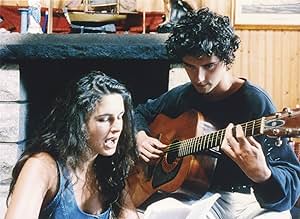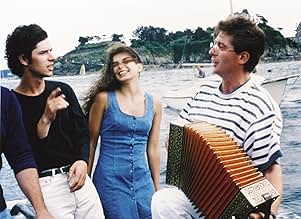CALIFICACIÓN DE IMDb
7.6/10
11 k
TU CALIFICACIÓN
Un tímido licenciado en matemáticas se toma unas vacaciones en Dinard antes de comenzar su primer trabajo.Un tímido licenciado en matemáticas se toma unas vacaciones en Dinard antes de comenzar su primer trabajo.Un tímido licenciado en matemáticas se toma unas vacaciones en Dinard antes de comenzar su primer trabajo.
- Dirección
- Guionista
- Elenco
- Premios
- 1 nominación en total
- Dirección
- Guionista
- Todo el elenco y el equipo
- Producción, taquilla y más en IMDbPro
Opiniones destacadas
9jéwé
A beautiful setting, good acting (Amanda Langlet is brilliant and deserves more roles than just the two Rohmer-films she was in) and a teasing simple tale of a young man who should enjoy a calm summer holiday but instead makes things difficult by not making his mind up about which girl he will choose. Had he stuck to Langlet he would have made the right choice, but then the film would be of Tweety & Sylvester-length. When he realises the girls are in charge, he leaves the stage.Conte d'été is certainly one of the best Rohmer movies.
Eric Rohmer's characters are mostly intellectuals, and mostly not so bright. On one hand, this is to Rohmer's credit, since it's realistic; on the other hand, the rarer characters with more penetrating intelligence (as in, especially, "My Night at Maude's") are nicer to listen to. Rohmer's characters love to yak on about ideas, art, and their feelings. The talk, on the most literal level, is generally unpersuasive, but relationships are formed through enjoyment of conversation, and character (not limited to vanity) is revealed via defensiveness and posturing.
"A Summer's Tale" follows twenty-something Gaspard during his summer vacation at a seaside resort town in Brittany. The people in the movie have fewer blind spots than most Rohmer characters, but not fewer difficulties. For a theme song, I'd suggest Weird Al Yankovic's "Good Enough For Now." The girl Gaspard had planned to meet alternately blows him off and strings him along. Another girl he meets, with whom there is palpable chemistry, has a distant boyfriend she doesn't seem very attached to. He vacillates on a third he is not crazy about but who bluntly conveys that she would take him. Gaspard is turned down twice for a romantic relationship (though not told to get lost entirely), and does the turning down once.
The interactions exhibit a believable mixture of genuine affection, indecision, and awkwardness. Rough edges are not glossed over as they might be by romanticism or in recollection. These might have been ingredients for a dull virtuous accuracy. But "A Summer's Tale" moves at a good pace, turns in the story feel natural and mostly not inevitable, and the whole is affecting and memorable.
"A Summer's Tale" follows twenty-something Gaspard during his summer vacation at a seaside resort town in Brittany. The people in the movie have fewer blind spots than most Rohmer characters, but not fewer difficulties. For a theme song, I'd suggest Weird Al Yankovic's "Good Enough For Now." The girl Gaspard had planned to meet alternately blows him off and strings him along. Another girl he meets, with whom there is palpable chemistry, has a distant boyfriend she doesn't seem very attached to. He vacillates on a third he is not crazy about but who bluntly conveys that she would take him. Gaspard is turned down twice for a romantic relationship (though not told to get lost entirely), and does the turning down once.
The interactions exhibit a believable mixture of genuine affection, indecision, and awkwardness. Rough edges are not glossed over as they might be by romanticism or in recollection. These might have been ingredients for a dull virtuous accuracy. But "A Summer's Tale" moves at a good pace, turns in the story feel natural and mostly not inevitable, and the whole is affecting and memorable.
10wobelix
First of all, let's say that Eric Rohmer deserves a 7 foot, solid gold Oscar, because he is one of the very last directors NOT to use Hollywood music. Or better: elevator muzak. He does not use music at all, unless someone within the story is singing or playing or listening.
No need here for external cues to explain to the viewer what's happening on screen. What a terrible shame Rohmer is the last to do so !!!
The cinematography of this SUMMER TALE flows magnificently, playing with the backdrop of beautiful Brittany. There are no hard or harsh cuts; no need for welding goggles to sit through this movie !
This is a small yet honest tale: the protagonists talk, rather than babble or throw comic book lines at each other.
A SUMMER'S TALE is not an epic, nor depicting a world changing event or some bigger than life humdrum. In all its subtlety and sincerity it is something that could happen to all of us.
Thank you Monsieur Eric Rohmer for yet another wonderful film.
No need here for external cues to explain to the viewer what's happening on screen. What a terrible shame Rohmer is the last to do so !!!
The cinematography of this SUMMER TALE flows magnificently, playing with the backdrop of beautiful Brittany. There are no hard or harsh cuts; no need for welding goggles to sit through this movie !
This is a small yet honest tale: the protagonists talk, rather than babble or throw comic book lines at each other.
A SUMMER'S TALE is not an epic, nor depicting a world changing event or some bigger than life humdrum. In all its subtlety and sincerity it is something that could happen to all of us.
Thank you Monsieur Eric Rohmer for yet another wonderful film.
Gaspard, played by Melvil Poupaud, is a song writer, a good-looking but
dull young man, a gauche loner with a flat voice and an inexpressive
face who comes to this delightful holiday island of Dinard off the
Brittany coast to await the arrival of his `sort-of' girl friend, who
demonstrates how much she loves him by keeping him waiting for two
weeks. During those two weeks, however, he finds two other girl friends
anything else. First he is picked up in a restaurant by Margot, a
waitress, who turns out not to be a waitress but an Ethnologist, just
helping out her aunt who owns the restaurant. Obviously such a bright
and intelligent girl could not be merely working-class!
Amanda Langlet, who plays Margot and who appeared ten years earlier in
Rohmer's `Pauline at the Beach.' is clearly the star of this film. Much
of the enjoyment of the film is derived from being in the company of
this vivacious girl and being allowed to eavesdrop on her talk with
Gaspard about love and relationships as they roam in the bright sunlight
around this lovely French sea-side resort and the countryside beyond.
She is such a very warm and sympathetic listener that it is difficult to
understand why he doesn't fall in love with her. Why she doesn't fall in
love with him is easier to understand. (you ask yourself; is this man a
very good actor or a very bad one?) He makes a couple of inept attempts
to move the relationship forward but is repulsed; she wants only
friendship - and you feel he is lucky to get that - while she awaits the
return of her Anthropologist boy-friend who is away in South America.
Gaspard's dullness is made obvious when she takes him to hear an old
sailor sing sea-shanties; her face so eager and enrapt as she listens
intently; his face, alongside, so lifeless.
She encourages him to take up with Solene, played by Gwenaelle Simon in
her first film, a friend of her's who they meet at a dance, but when he
does, she is jealous, jealous of their friendship she says but secretly
hurt that he now thinks of her as only a friend.
His relationship with Solene seems idyllic at first, they seem
marvelously happy and well suited to each other. He is accepted warmly
into her family, they all go sailing together and have a merry
sing-a-long to one of his songs. But then, sadly, her true nature shows;
she becomes aggressive and demanding, insisting that he take her to the
island of Quessant or their relationship is at an end. And now Lena, his
`sort-of' girl friend, played by Aurelia Nolin, appears and insists that
he take her instead. He must now choose.
Rohmer's films are never plot-dependent; he prefers to dwell on the
characters, to bring us into a close, intimate relation with them, while
they reveal themselves in talk. And when the characters are as
attractive as Margot
dull young man, a gauche loner with a flat voice and an inexpressive
face who comes to this delightful holiday island of Dinard off the
Brittany coast to await the arrival of his `sort-of' girl friend, who
demonstrates how much she loves him by keeping him waiting for two
weeks. During those two weeks, however, he finds two other girl friends
- or rather they find him. It must be his good-looks, it can't be
anything else. First he is picked up in a restaurant by Margot, a
waitress, who turns out not to be a waitress but an Ethnologist, just
helping out her aunt who owns the restaurant. Obviously such a bright
and intelligent girl could not be merely working-class!
Amanda Langlet, who plays Margot and who appeared ten years earlier in
Rohmer's `Pauline at the Beach.' is clearly the star of this film. Much
of the enjoyment of the film is derived from being in the company of
this vivacious girl and being allowed to eavesdrop on her talk with
Gaspard about love and relationships as they roam in the bright sunlight
around this lovely French sea-side resort and the countryside beyond.
She is such a very warm and sympathetic listener that it is difficult to
understand why he doesn't fall in love with her. Why she doesn't fall in
love with him is easier to understand. (you ask yourself; is this man a
very good actor or a very bad one?) He makes a couple of inept attempts
to move the relationship forward but is repulsed; she wants only
friendship - and you feel he is lucky to get that - while she awaits the
return of her Anthropologist boy-friend who is away in South America.
Gaspard's dullness is made obvious when she takes him to hear an old
sailor sing sea-shanties; her face so eager and enrapt as she listens
intently; his face, alongside, so lifeless.
She encourages him to take up with Solene, played by Gwenaelle Simon in
her first film, a friend of her's who they meet at a dance, but when he
does, she is jealous, jealous of their friendship she says but secretly
hurt that he now thinks of her as only a friend.
His relationship with Solene seems idyllic at first, they seem
marvelously happy and well suited to each other. He is accepted warmly
into her family, they all go sailing together and have a merry
sing-a-long to one of his songs. But then, sadly, her true nature shows;
she becomes aggressive and demanding, insisting that he take her to the
island of Quessant or their relationship is at an end. And now Lena, his
`sort-of' girl friend, played by Aurelia Nolin, appears and insists that
he take her instead. He must now choose.
Rohmer's films are never plot-dependent; he prefers to dwell on the
characters, to bring us into a close, intimate relation with them, while
they reveal themselves in talk. And when the characters are as
attractive as Margot
10grubertm
Usually this movie is categorized as either a love story, comedy or drama. IMO it is all and none of these- for the simple reason that the plot does not really matter. What has impressed me about this movie is the realistic way the characters are portrayed. If in a Hollywood movie a character has merely two motivations acting on him this is already interpreted as a "highly complex personality". So the common movie shows characters with a 1D psyche which contradicts the many facets of Self and the elusive, fuzzy nature of personality that one usually has or experiences. On the other hand there are movies which emphasize the highly artistic side by stuffing in all kinds of metaphors, analogies, images, etc. While this might make for an interesting intellectual puzzle- to me itïs just dull because this avoids the medium's strength of portraying intense situations. Just like a book written in Latin: it can be fun deciphering it- but it certainly does not make a good read. With these extremes out of the way- back to _Conte d'ete_. It's presented in a diary-like way with the protagonist either on his own or in company of one of the girls he is in love with. There are a few group scenes but thankfully they are rare and the main focus is on dialogues between the different personalities. All of the characters appear convinced of having a static self at the time of speaking. Yet throughout the movie one can see quite rapid changes going on which, just as in real life are not completely directed at a specific goal (IMO linear character development only takes place in bad short stories). So while each character remains mostly unaware about his/her individual changes they are made obvious by the characters describing each other. The dialogues are extremely lifelike- with all the mechanisms of exaggerating, rationalizing, white lies, etc.
What makes this movie a piece of art instead of just a diary film adaption is the timelessness with which it is presented. The images and characters are somewhat blurred or softened (_not_ in a visual sense!) as a fading memory might be. There are dates inserted every few minutes giving the plot a duration of about two weeks. Had this not been done it would be hard to tell whether the time span covered is 3 days or 3 years. Despite having an elaborate personality the characters at the same time remain general (archetypical, if you will) and personally I find it very easy to identify friends with these characters- which IMO is intended.
To sum it up, I see this movie as an evocative exercise in applied psychology reflecting or focusing life towards the audience. While there are some recurring commentaries the film is for the most part free of moral judgement.
There are two points of negative critic: - the otherwise excellent acting (which does not look like acting) is limited by the somewhat uninspired gestures of the main actor (Melvil Poupaud). - the Deus Ex Machina ending which is used to finish an otherwise endless story
What makes this movie a piece of art instead of just a diary film adaption is the timelessness with which it is presented. The images and characters are somewhat blurred or softened (_not_ in a visual sense!) as a fading memory might be. There are dates inserted every few minutes giving the plot a duration of about two weeks. Had this not been done it would be hard to tell whether the time span covered is 3 days or 3 years. Despite having an elaborate personality the characters at the same time remain general (archetypical, if you will) and personally I find it very easy to identify friends with these characters- which IMO is intended.
To sum it up, I see this movie as an evocative exercise in applied psychology reflecting or focusing life towards the audience. While there are some recurring commentaries the film is for the most part free of moral judgement.
There are two points of negative critic: - the otherwise excellent acting (which does not look like acting) is limited by the somewhat uninspired gestures of the main actor (Melvil Poupaud). - the Deus Ex Machina ending which is used to finish an otherwise endless story
¿Sabías que…?
- TriviaThis is, perhaps, the film in which Rohmer - notoriously silent about his private life - came closest to autobiography, filling the story with discrete traces and allusions to his own past. "Of all the films I've made, I think this is the most personal vehicle. Everything that is in this film is true. They are either things that I experienced in my youth or things that I noticed. [...] I have carried with me the story of this film, which was in part inspired by events that occurred during my adolescence, for a long time."
- Antoine de Baecque & Noël Herpe, "Éric Rohmer: A Biography" (New York: Columbia University Press, 2016), p. 458.
- ConexionesFeatured in The Movie Show: Episode dated 16 April 1997 (1997)
- Bandas sonorasFille de corsaire
Performed by Sebastien Erms
Selecciones populares
Inicia sesión para calificar y agrega a la lista de videos para obtener recomendaciones personalizadas
- How long is A Summer's Tale?Con tecnología de Alexa
Detalles
- Fecha de lanzamiento
- País de origen
- Idioma
- También se conoce como
- A Summer's Tale
- Locaciones de filmación
- Rue de la Malouine, Dinard, Ille-et-Vilaine, Francia(Solene's cousins house)
- Productoras
- Ver más créditos de la compañía en IMDbPro
Taquilla
- Total en EE. UU. y Canadá
- USD 198,126
- Fin de semana de estreno en EE. UU. y Canadá
- USD 12,863
- 22 jun 2014
- Total a nivel mundial
- USD 198,706
- Tiempo de ejecución1 hora 45 minutos
- Color
- Mezcla de sonido
Contribuir a esta página
Sugiere una edición o agrega el contenido que falta

Principales brechas de datos
By what name was Conte d'été (1996) officially released in India in English?
Responda





















